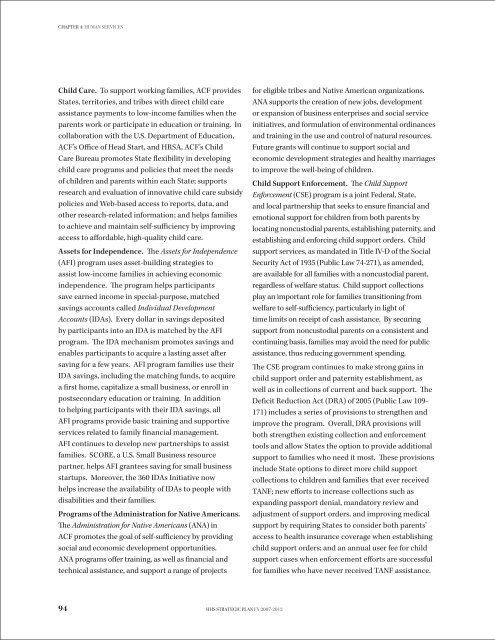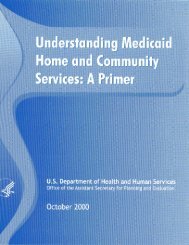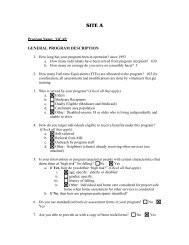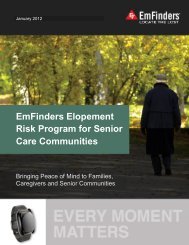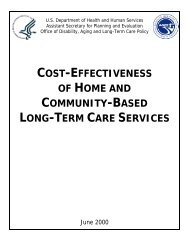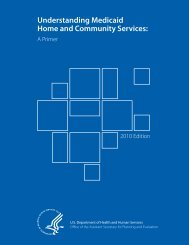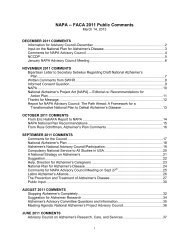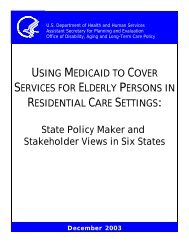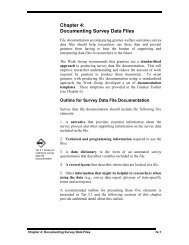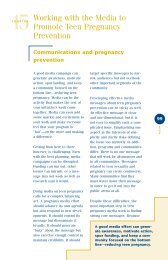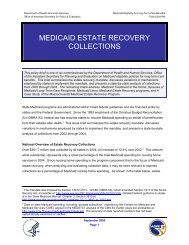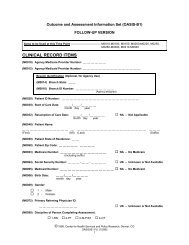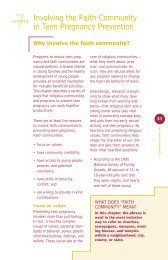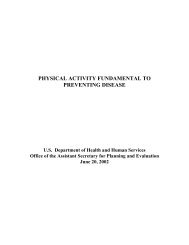STRATEGIC PLAN - ASPE - U.S. Department of Health and Human ...
STRATEGIC PLAN - ASPE - U.S. Department of Health and Human ...
STRATEGIC PLAN - ASPE - U.S. Department of Health and Human ...
Create successful ePaper yourself
Turn your PDF publications into a flip-book with our unique Google optimized e-Paper software.
CHAPTER 4: human servicesChild Care. To support working families, ACF providesStates, territories, <strong>and</strong> tribes with direct child careassistance payments to low-income families when theparents work or participate in education or training. Incollaboration with the U.S. <strong>Department</strong> <strong>of</strong> Education,ACF’s Office <strong>of</strong> Head Start, <strong>and</strong> HRSA, ACF’s ChildCare Bureau promotes State flexibility in developingchild care programs <strong>and</strong> policies that meet the needs<strong>of</strong> children <strong>and</strong> parents within each State; supportsresearch <strong>and</strong> evaluation <strong>of</strong> innovative child care subsidypolicies <strong>and</strong> Web-based access to reports, data, <strong>and</strong>other research-related information; <strong>and</strong> helps familiesto achieve <strong>and</strong> maintain self-sufficiency by improvingaccess to affordable, high-quality child care.Assets for Independence. The Assets for Independence(AFI) program uses asset-building strategies toassist low-income families in achieving economicindependence. The program helps participantssave earned income in special-purpose, matchedsavings accounts called Individual DevelopmentAccounts (IDAs). Every dollar in savings depositedby participants into an IDA is matched by the AFIprogram. The IDA mechanism promotes savings <strong>and</strong>enables participants to acquire a lasting asset aftersaving for a few years. AFI program families use theirIDA savings, including the matching funds, to acquirea first home, capitalize a small business, or enroll inpostsecondary education or training. In additionto helping participants with their IDA savings, allAFI programs provide basic training <strong>and</strong> supportiveservices related to family financial management.AFI continues to develop new partnerships to assistfamilies. SCORE, a U.S. Small Business resourcepartner, helps AFI grantees saving for small businessstartups. Moreover, the 360 IDAs Initiative nowhelps increase the availability <strong>of</strong> IDAs to people withdisabilities <strong>and</strong> their families.Programs <strong>of</strong> the Administration for Native Americans.The Administration for Native Americans (ANA) inACF promotes the goal <strong>of</strong> self-sufficiency by providingsocial <strong>and</strong> economic development opportunities.ANA programs <strong>of</strong>fer training, as well as financial <strong>and</strong>technical assistance, <strong>and</strong> support a range <strong>of</strong> projectsfor eligible tribes <strong>and</strong> Native American organizations.ANA supports the creation <strong>of</strong> new jobs, developmentor expansion <strong>of</strong> business enterprises <strong>and</strong> social serviceinitiatives, <strong>and</strong> formulation <strong>of</strong> environmental ordinances<strong>and</strong> training in the use <strong>and</strong> control <strong>of</strong> natural resources.Future grants will continue to support social <strong>and</strong>economic development strategies <strong>and</strong> healthy marriagesto improve the well-being <strong>of</strong> children.Child Support Enforcement. The Child SupportEnforcement (CSE) program is a joint Federal, State,<strong>and</strong> local partnership that seeks to ensure financial <strong>and</strong>emotional support for children from both parents bylocating noncustodial parents, establishing paternity, <strong>and</strong>establishing <strong>and</strong> enforcing child support orders. Childsupport services, as m<strong>and</strong>ated in Title IV-D <strong>of</strong> the SocialSecurity Act <strong>of</strong> 1935 (Public Law 74-271), as amended,are available for all families with a noncustodial parent,regardless <strong>of</strong> welfare status. Child support collectionsplay an important role for families transitioning fromwelfare to self-sufficiency, particularly in light <strong>of</strong>time limits on receipt <strong>of</strong> cash assistance. By securingsupport from noncustodial parents on a consistent <strong>and</strong>continuing basis, families may avoid the need for publicassistance, thus reducing government spending.The CSE program continues to make strong gains inchild support order <strong>and</strong> paternity establishment, aswell as in collections <strong>of</strong> current <strong>and</strong> back support. TheDeficit Reduction Act (DRA) <strong>of</strong> 2005 (Public Law 109-171) includes a series <strong>of</strong> provisions to strengthen <strong>and</strong>improve the program. Overall, DRA provisions willboth strengthen existing collection <strong>and</strong> enforcementtools <strong>and</strong> allow States the option to provide additionalsupport to families who need it most. These provisionsinclude State options to direct more child supportcollections to children <strong>and</strong> families that ever receivedTANF; new efforts to increase collections such asexp<strong>and</strong>ing passport denial, m<strong>and</strong>atory review <strong>and</strong>adjustment <strong>of</strong> support orders, <strong>and</strong> improving medicalsupport by requiring States to consider both parents’access to health insurance coverage when establishingchild support orders; <strong>and</strong> an annual user fee for childsupport cases when enforcement efforts are successfulfor families who have never received TANF assistance.94 HHS Strategic Plan FY 2007-2012


